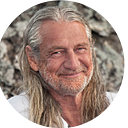Does the View Matter in Sadhana? An Interview With Mark Whitwell
Mark Whitwell | Heart of Yoga
Interviewer: Rosalind Atkinson
About Mark: Teaching since the 1970s, Mark Whitwell is known worldwide for his unique blend of caring about individuals, humor, wisdom, and truth-speaking. After discovering from his teachers, T. Krishnamacharya and TKV Desikachar, that yoga was the missing link in spiritual practice, Mark dedicated his life to sharing the principles of tantric Hatha yoga that he had received. Traveling to the United States in the 1990s to find a publisher for his teacher’s book, which he had put together, he was completely shocked to discover what was being practiced there, and how little resemblance it had to what he had been studying. Since then he has traveled the world sharing the principles that he learned with students around the world who have become fed up or injured within the yoga industrial complex. Mark is unapologetic about sharing yoga as a spiritual practice that is nonetheless available for people of all religions or none. His training introduces people to yoga that is neither gymnastics nor knowledge-acquisition, but participation in reality. He lives with his partner Rosalind in Fiji, where this interview took place.
Rosalind Atkinson: If you do your yoga with the mindset of trying to get somewhere, will it still be yoga?
Mark Whitwell: No. Yoga is your direct participation in the beauty, intelligence and harmony that is already established as life itself. There is no getting to that. You can’t practice separation and then suddenly get rewarded with unity after decades of slog. There is no process. Either you participate, or you deny. We are trained to see practice as something unpleasant that you do for a future reward, rather than the thing itself. Sorry to bear the bad news, but no reward is coming.
RA: So the view that we hold does matter? The feeling of practice matters?
Mark Whitwell: If you give the principles to your student accurately and spend some careful time and attention to see that they are practiced accurate, then the results will be this unitary movement of body mind and breath in reality, which is a nurturing force. Not trying to realise anything. And the result will come without any necessary thoughts or philosophical accompaniment to one’s practice.
RA: So would you ever teach a class without taking the time at the start to recognise everyone, to affirm to everyone that they are actually already the power of the cosmos. To establish a context of not trying to improve or struggle.
Mark Whitwell: I like to have a little conversation and get to know people. You’ve got to know them a little bit to make good decisions about what to give them as a suitable practice. But I do think that the principles alone without any words or philosophy will maintain the right view. Because you can say to someone, you are the power of the cosmos, it is a pure intelligence how your body is functioning, and everything in the natural world is utterly beautiful and you are that beauty, you are of the natural world, your body is already in a perfect harmony with air, with light, with water, with the green realm. You can say all that and someone can say, “I see what you mean, ok”. But that might last for one minute, and the patterning of their samskaras, their problematic presumptions are so powerful that they overwhelm the clarity of their insight. So they do go together. There’s jñana, the yoga of understanding, and then there’s the haṭhayoga, direct intimacy with reality as it is, and then there’s the bhakti, devotion to reality.
RA: Do you think that for us teachers out there, there’s a need to communicate to the people we’re sharing with that we see them, that we see them as part of life, to say that in our own language, from our own feeling?
Mark Whitwell: Yes. Us teachers, we need to talk in language that is our own, that is also relevant to the student. To have a conversation about “you are the wonder of existence, you are existingness, it’s amazing that you’re here” — whatever we want to say. It’s completely relevant to be said and an unusual conversation in our society, because it’s not the kind of thing that is usually being said. And to say them not as spiritual affirmations, not as poetry, not as quotes in a weirdly soft calm voice, not as inspirational ideas that are supposed to cajole your student into trying to realise it, it is just a conversation you have in a normal voice, because it’s so damn obvious. It’s a matter of fact! But do have that dialogue, and then the practice. But I am saying that the practice accurately done gives the siddhis, where what you might have affirmed becomes tangibly real in their own experience.
RA: But couldn’t you just do all the principles with a raging project of trying to self-improve?
Mark Whitwell: If the principles are taught accurately and implemented accurately as the unitary movement of body, mind, and breath, that itself does the work, because the mind follows the breath automatically. And the mind becomes linked to the whole body, and the whole body is the miracle of the universe, and the intelligence of the universe, the beauty of the universe. And that informs the mind. And the mind can feel itself arising as a function of life.
RA: Great. Thank you. We’ll call it “Mark Whitwell Yoga”
Mark Whitwell: No! Horrors. Please no.
